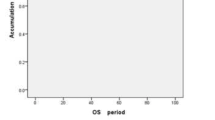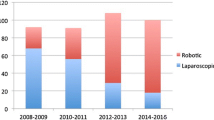Abstract
Robotic-assisted laparoscopic surgery attempts to facilitate rectal surgery in the narrow space of the pelvis. The aim of this study is to compare the outcomes of robotic versus laparoscopic surgery for rectal cancer. Monocentric retrospective study including 300 patients who underwent robotic (n = 178) or laparoscopic (n = 122) resection between Jan 2009 and Dec 2017 for high, mid and low rectal cancer. The robotic and laparoscopic groups were comparable with regard to pretreatment characteristics, except for sex and ASA status. There were no statistical differences between groups in the conversion rate to open surgery. Surgical morbidity and oncological quality did not differ in either group, except for the anastomosis leakage rate and the affected distal resection margin. There were no differences in overall survival rate between the laparoscopic and robotic group. Robotic surgery could provide some advantages over conventional laparoscopic surgery, such as three-dimensional views, articulated instruments, lower fatigue, lower conversion rate to open surgery, shorter hospital stays and lower urinary and sexual dysfunctions. On the other hand, robotic surgery usually implies longer operation times and higher costs. As shown in the ROLARR trial, no statistical differences in conversion rate were found between the groups in our study. When performed by experienced surgeons, robotic surgery for rectal cancer could be a safe and feasible option with no significant differences in terms of oncological outcomes in comparison to laparoscopic surgery.


Similar content being viewed by others
References
Matsuyama T, Kinugasa Y, Nakajima Y et al (2018) Robotic-assisted surgery for rectal cancer: current state and future perspective. Ann Gastroenterol Surg 2(6):406–412
Moghadamyeghaneh Z, Phelan M, Smith BR, Stamos MJ (2015) Outcomes of open, laparoscopic, and robotic abdominoperineal resections in patients with rectal cancer. Dis Colon Rectum 58(12):1123–1129
Galata C, Vassilev G, Haas F, Kienle P, Büttner S, Reißfelder C et al (2019) Clinical, oncological, and functional outcomes of Da Vinci (Xi)–assisted versus conventional laparoscopic resection for rectal cancer: a prospective, controlled cohort study of 51 consecutive cases. Int J Colorectal Dis 34(11):1907–1914
Jayne D, Pigazzi A, Marshall H, Croft J, Corrigan N, Copeland J et al (2017) Effect of robotic-assisted vs conventional laparoscopic surgery on risk of conversion to open laparotomy among patients undergoing resection for rectal cancer the rolarr randomized clinical trial. JAMA 318(16):1569–1580
Kim CW, Kim CH, Baik SH (2014) Outcomes of robotic-assisted colorectal surgery compared with laparoscopic and open Surgery: a systematic review. J Gastrointest Surg 18(4):816–830
Crolla RMPH, Mulder PG, van der Schelling GP (2018) Does robotic rectal cancer surgery improve the results of experienced laparoscopic surgeons? An observational single institution study comparing 168 robotic assisted with 184 laparoscopic rectal resections. Surg Endosc 32(11):4562–4570
Dindo D, Demartines N, Clavien PA (2004) Classification of surgical complications: a new proposal with evaluation in a cohort of 6336 patients and results of a survey. Ann Surg 240(2):205–213
Lim DR, Bae SU, Hur H, Min BS, Baik SH, Lee KY et al (2017) Long-term oncological outcomes of robotic versus laparoscopic total mesorectal excision of mid–low rectal cancer following neoadjuvant chemoradiation therapy. Surg Endosc 31(4):1728–1737
Jeong SY, Park JW, Nam BH, Kim S, Kang SB, Lim SB, Choi HS, Kim DW, Chang HJ, Kim DY, Jung KH, Kim TY, Kang GH, Chie EK, Kim SY, Sohn DK, Kim DH, Kim JS, Lee HS, Kim JH, Oh JH (2014) Open versus laparoscopic surgery for mid-rectal or low-rectal cancer after neoadjuvant chemoradiotherapy (COREAN trial): survival outcomes of an open-label, non-inferiority, randomised controlled trial. Lancet Oncol 15(7):767–774
van der Pas MH, Haglind E, Cuesta MA, Furst A, Lacy AM, Hop WC, Bonjer HJ (2013) Laparoscopic versus open surgery for rectal cancer (COLOR II): short-term outcomes of a randomised, phase 3 trial. Lancet Oncol 14(3):210–218
Bonjer HJ, Deijen CL, Haglind E (2015) A randomized trial of laparoscopic versus open surgery for rectal cancer. N Engl J Med 373(2):194
Engstrom PF, Arnoletti JP, Benson AB 3rd, Chen YJ, Choti MA, Cooper HS, Covey A, Dilawari RA, Early DS, Enzinger PC, Fakih MG, Fleshman J Jr, Fuchs C, Grem JL, Kiel K, Knol JA, Leong LA, Lin E, Mulcahy MF, Rao S, Ryan DP, Saltz L, Shibata D, Skibber JM, Sofocleous C, Thomas J, Venook AP (2018) Willett C (2009) NCCN clinical practice guidelines in oncology: rectal cancer. J Natl Compr Canc Netw 7(8):838–881
van Gijn W, Marijnen CA, Nagtegaal ID, Kranenbarg EM, Putter H, Wiggers T, Rutten HJ, Pahlman L, Glimelius B, van de Velde CJ (2011) Preoperative radiotherapy combined with total mesorectal excision for resectable rectal cancer: 12-year followup of the multicentre. Lancet Oncol 12(6):575–582
Kye BH, Cho HM (2014) Overview of radiation therapy for treating rectal cancer. Ann Coloproctol 30(4):165–174
Kim MJ, Park SC, Park JW, Chang HJ, Kim DY, Nam BH, Sohn DK, Oh JH (2018) Robot-assisted versus laparoscopic surgery for rectal cancer: a phase II open label prospective randomized controlled trial. Ann Surg 267(2):243–251
Chan AC, Poon JT, Fan JK, Lo SH, Law WL (2008) Impact of conversion on the long-term outcome in laparoscopic resection of colorectal cancer. Surg Endosc 22(12):2625–2630
Ptok H, Kube R, Schmidt U, Köckerling F, Gastinger I, Lippert H (2009) Conversion from laparoscopic to open colonic cancer resection - associated factors and their influence on long-term oncological outcome. Eur J Surg Oncol 35(12):1273–1279
White I, Greenberg R, Itah R, Inbar R, Schneebaum S, Avital S (2011) Impact of conversion on short and long-term outcome in laparoscopic resection of curable colorectal cancer. JSLS 15(2):182–187
Scheidbach H, Garlipp B, Oberländer H, Adolf D, Köckerling F, Lippert H (2011) Conversion in laparoscopic colorectal cancer surgery: impact on short- and long-term outcome. J Laparoendosc Adv Surg Tech A 21(10):923–927
Rottoli M, Stocchi L, Geisler DP, Kiran RP (2012) Laparoscopic colorectal resection for cancer: effects of conversion on long-term oncologic outcomes. Surg Endosc 26(7):1971–1976
Clancy C, O’Leary DP, Burke JP, Redmond HP, Coffey JC, Kerin MJ, Myers E (2015) A meta-analysis to determine the oncological implications of conversion in laparoscopic colorectal cancer surgery. Colorectal Dis 17(6):482–490
Huang Y-M, Huang YJ, Wei P-L (2017) Outcomes of robotic versus laparoscopic surgery for mid and low rectal cancer after neoadjuvant chemoradiation therapy and the effect of learning curve. Medicine (Baltimore) 96(40):e8171
Cho MS, Baek SJ, Hur H, Min BS, Baik SH, Lee KY, Kim NK (2015) Short and long-term outcomes of robotic versus laparoscopic total mesorectal excision for rectal cancer: a case-matched retrospective study. Medicine (Baltimore) 94(11):e522
Park EJ, Cho MS, Baek SJ, Hur H, Min BS, Baik SH, Lee KY, Kim NK (2015) Long-term oncologic outcomes of robotic low anterior resection for rectal cancer: a comparative study with laparoscopic surgery. Ann Surg 261(1):129–137
Huang CW, Yeh YS, Ma CJ et al (2015) Robotic colorectal surgery for laparoscopic surgeons with limited experience: preliminary experiences for 40 consecutive cases at a single medical center. BMC Surg 15:73
de Jesus JP, Valadao M, de Castro Araujo RO et al (2016) The circumferential resection margins status: a comparison of robotic, laparoscopic and open total mesorectal excision for mid and low rectal cancer. Eur J Surg Oncol 42:808–812
Ielpo B, Duran H, Diaz E, Fabra I, Caruso R, Malavé L et al (2017) Robotic versus laparoscopic surgery for rectal cancer: a comparative study of clinical outcomes and costs. Int J Colorectal Dis 32(10):1423–1429
Armijo PR, Huang CK, High R, Leon M, Siu KC, Oleynikov D (2019) Ergonomics of minimally invasive surgery: an analysis of muscle effort and fatigue in the operating room between laparoscopic and robotic surgery. Surg Endosc 33(7):2323–2331
Zihni AM, Ohu I, Cavallo JA, Cho S, Awad MM (2014) Ergonomic analysis of robot-assisted and traditional laparoscopic procedures. Surg Endosc 28(12):3379–3384
Janki S, Mulder EE, IJzermans JN, Tran TK (2017) Ergonomics in the operating room. Surg Endosc 31(6):2457–2466
Moss EL, Sarhanis P, Ind T, Smith M, Davies Q, Zecca M (2020) Impact of obesity on surgeon ergonomics in robotic and straight-stick laparoscopic surgery. J Minim Invasive Gynecol 27(5):1063–1069
Author information
Authors and Affiliations
Corresponding author
Ethics declarations
Conflict of interest
Author Gutiérrez Delgado MP, Mera Velasco S, Turiño Luque JD, González Poveda I, Ruiz López M and Santoyo Santoyo J declare that they have no conflict of interest.
Ethical approval
The trial received institutional ethical approval by the Provincial Research Ethics Committee of Malaga, Andalusia, Spain.
Consent to participate
All procedures followed were in accordance with the ethical standards of the responsible committee on human experimentation (institutional and national) and with the Helsinki Declaration of 1975, as revised in 2000. Informed consent was obtained from all patients for being included in the study.
Additional information
Publisher's Note
Springer Nature remains neutral with regard to jurisdictional claims in published maps and institutional affiliations.
Rights and permissions
About this article
Cite this article
del Gutiérrez Delgado, M.P., Mera Velasco, S., Turiño Luque, J.D. et al. Outcomes of robotic-assisted vs conventional laparoscopic surgery among patients undergoing resection for rectal cancer: an observational single hospital study of 300 cases. J Robotic Surg 16, 179–187 (2022). https://doi.org/10.1007/s11701-021-01227-2
Received:
Accepted:
Published:
Issue Date:
DOI: https://doi.org/10.1007/s11701-021-01227-2




